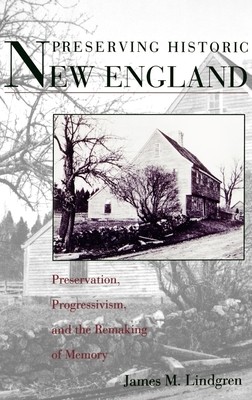
- Išsiųsime per 10–14 d.d.
- Autorius: James M Lindgren
- Leidėjas: Oxford University Press, USA
- ISBN-10: 0195093631
- ISBN-13: 9780195093636
- Formatas: 16.1 x 24.2 x 2 cm, kieti viršeliai
- Kalba: Anglų
- Extra -25 % nuolaida šiai knygai su kodu: ENG25
Atsiliepimai
Aprašymas
By the first years of the twentieth century the memory of old-time New England was in danger. What had once been a land of small towns populated by tradition-minded Yankees was now becoming almost unrecognizable with a floodtide of immigrants and the constant change of a modernizing society. At the same time, cities such as Boston, Portsmouth, and Salem were bursting at the seams with factories, high-rises, and uncontrollable growth. During a period when the Colonial Revival and progressive movements held sway, Yankees asserted their influence through campaigns to redefine the meaning of their Anglo-American forebears. As part of the reaction, the modern preservation movement was founded by William Sumner Appleton, Jr., a privileged, old-blooded Bostonian. Resisting not simply this avalanche of change but the amateurish romanticism of fellow antiquaries, Appleton founded the Society for the Preservation of New England Antiquities in 1910. While examining SPNEA in the context of
progressivism, Preserving Historic New England focuses on its redefinition of preservation to fit the methodology of science, the economy of capitalism, and the aestheticism of architecture. In so doing, preservation not only became a profession defined by those male worlds, but remade Yankee memory to accord with the modern corporate order.
EXTRA 25 % nuolaida su kodu: ENG25
Akcija baigiasi už 3d.22:59:25
Nuolaidos kodas galioja perkant nuo 10 €. Nuolaidos nesumuojamos.

- Autorius: James M Lindgren
- Leidėjas: Oxford University Press, USA
- ISBN-10: 0195093631
- ISBN-13: 9780195093636
- Formatas: 16.1 x 24.2 x 2 cm, kieti viršeliai
- Kalba: Anglų Anglų
By the first years of the twentieth century the memory of old-time New England was in danger. What had once been a land of small towns populated by tradition-minded Yankees was now becoming almost unrecognizable with a floodtide of immigrants and the constant change of a modernizing society. At the same time, cities such as Boston, Portsmouth, and Salem were bursting at the seams with factories, high-rises, and uncontrollable growth. During a period when the Colonial Revival and progressive movements held sway, Yankees asserted their influence through campaigns to redefine the meaning of their Anglo-American forebears. As part of the reaction, the modern preservation movement was founded by William Sumner Appleton, Jr., a privileged, old-blooded Bostonian. Resisting not simply this avalanche of change but the amateurish romanticism of fellow antiquaries, Appleton founded the Society for the Preservation of New England Antiquities in 1910. While examining SPNEA in the context of
progressivism, Preserving Historic New England focuses on its redefinition of preservation to fit the methodology of science, the economy of capitalism, and the aestheticism of architecture. In so doing, preservation not only became a profession defined by those male worlds, but remade Yankee memory to accord with the modern corporate order.




Atsiliepimai